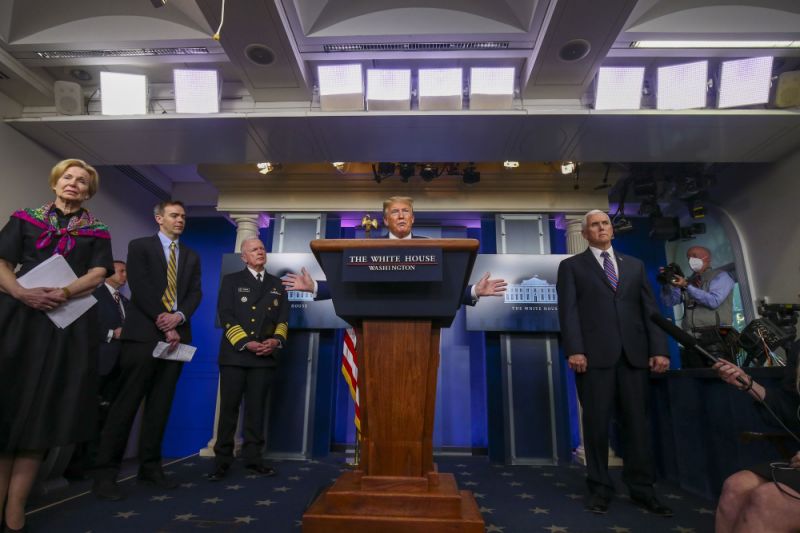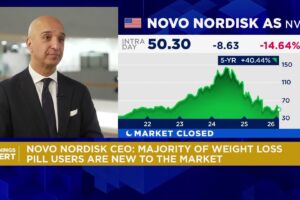
(Bloomberg) — Singapore, once a standard bearer for taming the virus, reported more than 1,000 cases for a second day and will extend its partial lockdown for four more weeks. Italy will present a plan this week to ease rigid curbs in the country, joining others in Europe pursuing a gradual return to normality.
Germany reported the smallest increase in infections this month after easing some curbs earlier this week. Still, Munich’s Oktoberfest festival was canceled for the first time since World War II, in a sign that life will not return to normal for months.
In the U.S., President Donald Trump said he’ll sign an executive order temporarily suspending immigration, while the Senate neared a vote on a stimulus package of as much as $500 billion. Southern Republican governors are pushing to lift curbs and reopen their economies.
Key Developments
Virus Tracker: Cases top 2.4 million; deaths exceed 170,000How Singapore flipped from virus hero to cautionary taleU.S. Treasury hands out $2.9 billion to airlinesEurope tries to ease lockdowns with eye on new cases
Subscribe to a daily update on the virus from Bloomberg’s Prognosis team here. Click VRUS on the terminal for news and data on the coronavirus.
Belgian Hospital Admissions at One-Month Low (5:23 p.m. HK)
Belgian health officials reported 172 new hospitalizations in the past 24 hours, the lowest number since March 18. The number of ICU patients increased by 8 to 1,079. Fatalities rose by 170, including 78 suspected infections, to 5,998 after an increase of 168 the prior day. Belgium is one of few countries that also reports suspected virus fatalities which haven’t been confirmed by a diagnostic death.
Spain Cases Rise by Fewest in Three Days (5:18 p.m. HK)
There were 3,968 new infections in the 24 hours through Tuesday, taking the total to 204,178, according to Health Ministry data. The number of fatalities rose by 430, compared to Monday’s increase of 399, to 21,282. More than 80,000 have recovered from the disease in the world’s most extensive outbreak behind the U.S.
The numbers of new cases and deaths have dropped to about half their levels at the start of April, prompting the government to shift focus to a possible easing of lockdown measures. Still, gains are fragile and ending the lockdown will be a gradual process, Prime Minister Pedro Sanchez said at the weekend.
German Investors Confident Growth Will Return (5:16 p.m. HK)
Investors expressed confidence that Germany’s economy will start growing again in the third quarter, after the government started easing restrictions. While an assessment of current conditions in Europe’s largest economy plummeted to the lowest in more than a decade in April, expectations for the next six months climbed to the highest level since mid-2015.
“Financial-market experts are beginning to see a light at the end of the very long tunnel,” ZEW President Achim Wambach said in a statement. They indicated that they don’t expect output to return to pre-virus levels before 2022, he said.
Singapore Extends Partial Lockdown (5:13 p.m. HK)
Singapore will extend its partial lockdown for another four weeks until June 1 to “decisively” bring down coronavirus cases within the community and close more workplaces, with only the most essential services remaining open.
Prime Minister Lee Hsien Loong said the city-state must press on to bring down daily infections more sharply, to single digit, or even zero. The announcement comes two weeks after Singapore imposed so-called “circuit breaker” measures that have closed schools and most office places. Social gatherings are banned and only essential businesses are allowed to operate. Virus cases topped 1,000 for a second day, with 1,111 new cases reported on Tuesday as infections among foreign workers surge.
Singapore was a global standard bearer for taming the virus in the early days of the pandemic. Now it’s home to Southeast Asia’s largest recorded outbreak and is racing to regain control. Rival financial hub Hong Kong, meanwhile, has seen a drop off in daily new infections, but is still extending social distancing restrictions for 14 days.
Brent Crude Futures Hit Lowest Since 2002 (5:03 p.m. HK)
Brent crude futures dropped to below $20 a barrel, the lowest since 2002, a day after West Texas Intermediate futures traded at a negative price for the first time in history. The coronavirus hit to the global economy, particularly air travel, has reduced demand and led to limited storage capacity for the unused fuel.
Pandemic Sends England & Wales Death Toll to Record (4:47 p.m. HK)
The U.K. reported its highest weekly death count in records going back to 2010, as the damage caused by the coronavirus epidemic continues to rise. The Office For National Statistics said Tuesday there were 18,516 deaths registered in the week ending April 10, 76% more than the average figure for the same week over the previous five years. The excess deaths are significantly more than the ONS officially attributed to the virus, suggesting the official count may miss many deaths caused by the epidemic.
The British government has already faced scrutiny over the way it counts Covid-19 deaths. Figures published daily by the authorities only include deaths among the hospitalized, and unlike neighboring France, don’t track those in care facilities.
EU Industrial-Policy Chief Sounds Alarm Over Tourism (4:36 p.m. HK)
European Union industrial-policy chief Thierry Breton painted a bleak outlook for the EU tourism sector, saying it was hit early by the coronavirus outbreak and will suffer longer. Breton ruled out a normal holiday season this summer and announced a plan for a European tourism summit in September or October to address challenges for an industry that contributes around 10% to the EU economy.
“We are going to need massive amounts of funds,” he said in a video conference with the European Parliament’s transport committee.
EU Must Share Cost or Pay Political Price (4:17 p.m. HK)
Governments must provide forceful and symmetric fiscal support in response to the crisis because weakness in one part of the region could ultimately depress growth and employment across the bloc, Executive Board member Fabio Panetta argued in a Politico op-ed. Financing costs should be pushed “very far” into the future, he added.
“Euro-zone countries should shoulder the cost of financing this crisis together, because they all stand to benefit by doing so,” Panetta said. “Failure to act now will not insulate taxpayers from the costs of this crisis. Quite the opposite: it will amplify those costs when they finally come due.”
The remarks come as European Union leaders prepare for a video conference Thursday where they will discuss how to finance economic recovery efforts. In Panetta’s native Italy, resentment at the EU’s response to the pandemic has been running deep in recent weeks.
Pharming Soars on Drug Results (3:55 p.m. HK)
Pharming jumped as much as 41%, the most since 2014, after the company said its Ruconest drug showed encouraging results in five covid-19 patients hospitalized with severe pneumonia. The company now plans a multinational study with as many as 150 patients.
Russian Cases Rise 12%, Topping 50,000 (3:45 p.m. HK)
Confirmed coronavirus cases rose by 5,642 overnight to to 52,763 as the number of new daily cases stayed above 4,000 for the fifth consecutive day. The death toll reached 456, with 51 people dying overnight.
Russia’s underfunded and poorly equipped regional hospitals and clinics are emerging as hot spots for transmission as the outbreak spreads beyond the capital into the hinterlands. Moscow, which is entering its fourth week of shutdown, has seen the number of severely ill stabilize over the last 10 days.
German Oktoberfest Canceled (3:33 p.m. HK)
The annual Oktoberfest folk and beer festival in Munich originally scheduled to begin Sept. 19 has been canceled due to the coronavirus, Bavarian Premier Markus Soeder said.
“We agreed that the risk is simply too great,” Soeder said at a news conference. Munich Mayor Dieter Reiter said the event brings in around 1.2 billion euros ($1.3 billion) for local businesses, and that hotels, restaurants and taxi drivers would especially suffer.
The Oktoberfest, first celebrated in 1810, is one of the world’s biggest folk festivals and draws around 6 million visitors each year. Germany has banned large public gatherings until at least the end of August.
Italy Plans to Gradually Ease Lockdown From May 4 (2:12 p.m. HK)
Italy will present a plan this week to ease its lockdown, said Prime Minister Giuseppe Conte in a post on Facebook. “A reasonable forecast” is that a detailed restart program will be applied from May 4, Conte said.
Conte said that his cabinet is working with various experts to coordinate the so-called “phase 2” when Italy will have to cohabit with the coronavirus. The plan will be done at a national level but it will take into account regional differences, Conte said.
Peugeot Maker PSA Expects Chaotic Rebound (2:09 p.m. HK)
French automaker PSA Group said sales slumped 16% in the first quarter and forecast the European market will shrink by a quarter this year as the coronavirus pandemic slams the car industry. The company planning to merge with Fiat Chrysler Automobiles NV has secured liquidity and cut costs, Chief Financial Officer Philippe de Rovira said in a statement, adding that it is preparing a rebound in a chaotic economic environment.
German Cases Rise the Least This Month (1:35 p.m. HK)
The number of coronavirus cases in Germany increased by the smallest amount this month as the country starts to gradually loosen restrictions on public life. There were 1,323 new infections in the 24 hours through Tuesday morning, taking the total to 147,065, according to data from Johns Hopkins University. Fatalities rose by 220, the most in three days, to 4,862.
Angela Merkel warned on Monday that the public debate about easing preventative measures brought in last month risks sparking a new wave of infections. In a closed-door meeting of her Christian Democratic Union party, the chancellor made it clear that her government doesn’t plan to introduce any further restrictions, though the option remains on the table.
Virus Wipes Out More Than 90% of International Flights (12:26 p.m. HK)
Airlines have cut international capacity to just half a million seats a week from an average of 5.9 million before the coronavirus shut borders and decimated travel demand, according to OAG Aviation Worldwide.
“There isn’t much more international capacity that can be dropped around the globe,” OAG senior analyst John Grant wrote in a post dated April 20. Strong domestic capacity has at least helped stem declines in countries such as the U.S., Japan and Indonesia, though demand is lacking, Grant said.
Indonesia Bans Mass Travel Ahead of Eid Festival (12:07 p.m HK)
Indonesia banned an annual ritual of citizens traveling in large numbers to their hometowns and villages ahead of the Muslim festival of Eid al-Fitr to prevent spread of coronavirus.
Health-care experts had called for a ban on the exodus, known as mudik, as it could spread the virus to more areas from the Greater Jakarta area, the nation’s epicenter of the outbreak. Roughly one out of every eight Indonesians head home ahead of Eid, the Muslim festival marking the end of Ramadan. An estimated 19.5 million people traveled to their hometowns from big cities like Jakarta during last year’s Eid, official data show.
Australia Sees ‘Road Back’ (11:58 a.m. HK)
Australia’s government said lockdown measures have led to a “sustained and consolidated” slowdown in new coronavirus cases, though cautioned there will be no easing of restrictions for at least three more weeks. The growth rate has been less than 1% for nine consecutive days and has averaged less than 0.5% for the past three days, Health Minister Greg Hunt said.
In a sign of the nation’s success in flattening the curve, the government announced that elective surgery will gradually resume starting next week — one of the first steps to reopening locked down sections of the economy.
Trump Says He’ll Suspend Immigration to U.S. (10:24 a.m. HK)
President Donald Trump said he’ll sign an executive order temporarily suspending immigration into the U.S. as the country tries to contain the spread of the coronavirus. Trump made the announcement by tweet late Monday night, and did not offer specifics, such as the time frame or the scope of who would be affected. The White House did not immediately respond to a request for comment.
<p class="canvas-atom canvas-text Mb(1.0em) Mb(0)–sm Mt(0.8em)–sm" type="text" content="For more articles like this, please visit us at bloomberg.com” data-reactid=”85″>For more articles like this, please visit us at bloomberg.com
<p class="canvas-atom canvas-text Mb(1.0em) Mb(0)–sm Mt(0.8em)–sm" type="text" content="Subscribe now to stay ahead with the most trusted business news source.” data-reactid=”86″>Subscribe now to stay ahead with the most trusted business news source.
©2020 Bloomberg L.P.







